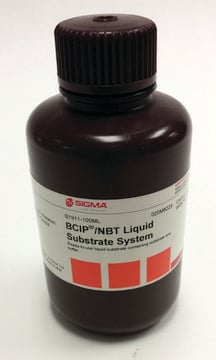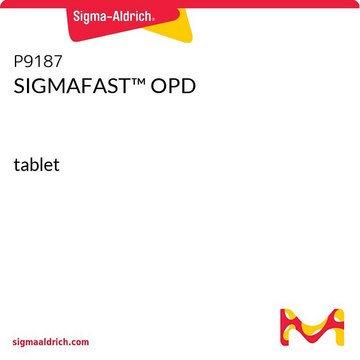T0565
3,3′,5,5′-Tetramethylbenzidine
TMB membrane substrate, chromogenic, liquid
Sinónimos:
TMB membrane substrate
About This Item
Productos recomendados
Nombre del producto
3,3′,5,5′-Tetramethylbenzidine (TMB) Liquid Substrate System for Membranes, ready to use solution
Quality Level
form
liquid
storage temp.
2-8°C
Categorías relacionadas
General description
Application
- enzyme-linked immune absorbent spot (ELISPOT) assay
- as a substrate for IgG peroxidase
- in the visualization of immunocomplexes
Physical form
Storage Class
12 - Non Combustible Liquids
wgk_germany
WGK 3
flash_point_f
Not applicable
flash_point_c
Not applicable
Elija entre una de las versiones más recientes:
¿Ya tiene este producto?
Encuentre la documentación para los productos que ha comprado recientemente en la Biblioteca de documentos.
Los clientes también vieron
Artículos
The field of proteomics is continually looking for new ways to investigate protein dynamics within complex biological samples. Recently, many researchers have begun to use RNA interference (RNAi) as a method of manipulating protein levels within their samples, but the ability to accurately determine these protein amounts remains a challenge. Fortunately, over the past decade, the field of proteomics has witnessed significant advances in the area of mass spectrometry. These advances, both in instrumentation and methodology, are providing researchers with sensitive assays for both identification and quantification of proteins within complex samples. This discussion will highlight some of these methodologies, namely the use of Multiple Reaction Monitoring (MRM) and Protein-AQUA.
Nitroblue Tetrazolium (NBT) is used with the alkaline phosphatase substrate 5-Bromo- 4-Chloro-3-Indolyl Phosphate (BCIP) in western blotting and immunohistological staining procedures. These substrate systems produce an insoluble NBT diformazan end product that is blue to purple in color and can be observed visually.
Nuestro equipo de científicos tiene experiencia en todas las áreas de investigación: Ciencias de la vida, Ciencia de los materiales, Síntesis química, Cromatografía, Analítica y muchas otras.
Póngase en contacto con el Servicio técnico











